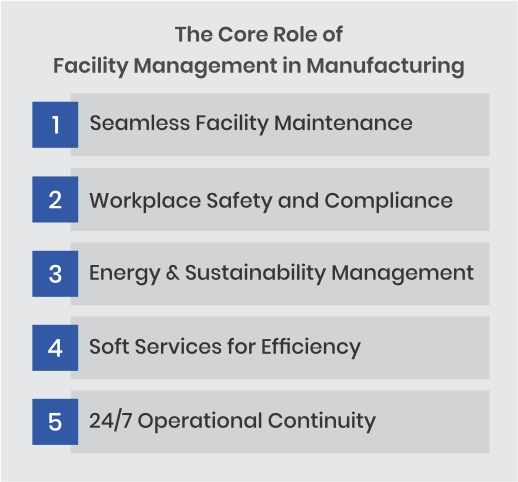Ensuring 24/7 operations is vital for India’s manufacturing sector. With the support of Facility Management Companies India, industries achieve seamless productivity, safety, and sustainability. From Facility Planning India and facility services management to Integrated Facility Management India, expert solutions ensure efficiency and compliance. Specialized services like Facility Maintenance India and Facade Cleaning India enhance resilience. With Facility Management India driving round-the-clock operations, manufacturers gain reliability, cost savings, and global competitiveness through trusted Facilities Management India expertise.
Ensuring 24/7 Operations: The Importance of Facility Management in Manufacturing
Introduction
India’s manufacturing industry has emerged as a cornerstone of the nation’s economic growth, driven by rapid industrialization, the government’s “Make in India” initiative, and global supply chain integration. In this dynamic environment, uninterrupted production and operational continuity are not just desirable-they are essential for competitiveness. To ensure seamless functioning, manufacturers increasingly rely on Facility Management Companies India that bring expertise, efficiency, and innovation to keep plants operational 24/7.
From facility planning in India to the deployment of integrated facility management India solutions, the role of facility services management is pivotal in sustaining round-the-clock operations. This blog explores how facility management underpins manufacturing resilience, reduces downtime, and creates sustainable growth for industries across the nation.
The Manufacturing Context in India
Manufacturing facilities in India operate under complex conditions—high production targets, large workforces, strict compliance requirements, and growing emphasis on sustainability. Downtime in such environments can lead to massive losses, not only financially but also in terms of customer trust and market share.
Challenges include:
- Unplanned equipment breakdowns
- Labor shortages or absenteeism
- Increasing energy and maintenance costs
- Compliance with safety, environmental, and quality standards
- Rising expectations for sustainable and digital-ready operations
Here, the contribution of Facility Management India becomes indispensable. These companies act as silent enablers, ensuring uninterrupted operations while manufacturers focus on their core functions-production and innovation.
The Core Role of Facility Management in Manufacturing

1. Seamless Facility Maintenance
Timely and predictive maintenance is the backbone of uninterrupted production. Facility Maintenance India providers use preventive and predictive maintenance strategies to reduce machine downtime. By leveraging IoT-enabled sensors and CMMS (Computerized Maintenance Management Systems), facility managers can detect anomalies early, schedule timely interventions, and ensure that equipment runs at peak performance.
2. Workplace Safety and Compliance
Factories are high-risk environments with machinery, chemicals, and large-scale operations. Facility managers implement rigorous safety protocols, conduct audits, and ensure compliance with statutory requirements such as the Factories Act, Fire Safety guidelines, and environmental laws. In addition, they create awareness among employees, making safety a culture rather than just a regulation.
3. Energy and Sustainability Management
Sustainability is no longer optional. With India’s push towards net-zero goals, facilities management India emphasizes energy efficiency, renewable integration, and waste management. Facility managers design and implement green initiatives such as LED retrofitting, HVAC optimization, rainwater harvesting, and solar power integration. The outcome: lower costs and greener operations.
4. Soft Services for Efficiency
While production remains the focus, support services such as housekeeping, horticulture, pest control, and facade cleaning India play an equally important role. Clean, well-maintained facilities not only improve productivity but also create a healthy work environment for employees. In manufacturing hubs, mechanized housekeeping solutions and façade cleaning ensure compliance with global hygiene and safety benchmarks.
5. 24/7 Operational Continuity
Manufacturing plants rarely sleep. Whether it is an automotive factory in Pune or a pharmaceutical hub in Hyderabad, production continues round the clock. Facility services management ensures that power, water, air conditioning, cleaning, catering, and security systems are available 24/7. This reduces disruptions, maintains worker morale, and guarantees product quality.
Why 24/7 Operations Matter in Manufacturing
Meeting Global Supply Chain Demands
With India positioning itself as a global manufacturing hub, uninterrupted production is vital to meet international demand. Any stoppage can delay deliveries, disrupt supply chains, and damage credibility.
Reducing Costly Downtime
According to industry estimates, downtime in manufacturing can cost lakhs of rupees per hour, depending on the industry. Through predictive maintenance and quick response systems, facility management reduces these risks significantly.
Enhancing Worker Productivity
Round-the-clock operations require motivated and healthy employees. Facility managers provide high-quality food services, safe workspaces, and welfare amenities that keep the workforce engaged and productive.
Ensuring Customer Trust
For industries like pharmaceuticals, automotive, and electronics, reliability is everything. Facility management ensures that the plants meet global standards, building long-term trust with customers and stakeholders.
Integrated Facility Management: A Game-Changer
Traditional facility management services, which often operated in silos, have now evolved into Integrated Facility Management India. This approach consolidates all services—hard services like maintenance and utilities, and soft services like housekeeping and catering—under a single framework.
Benefits include:
- Cost Optimization: Unified contracts reduce overhead costs and improve accountability.
- Technology Integration: Digital dashboards, smart sensors, and data analytics provide real-time visibility.
- Consistency: Standardized processes across multiple sites ensure uniform quality.
- Strategic Focus: Manufacturers can focus on innovation while facility partners manage operations end-to-end.
The Role of Technology in Facility Management
Modern facility planning India integrates digital tools that enhance transparency and efficiency:
- IoT and Sensors: Monitor equipment, temperature, energy, and air quality in real time.
- AI and Analytics: Predict breakdowns, optimize energy usage, and streamline workforce allocation.
- DigiCompliance Platforms: Ensure all staff certifications, safety records, and statutory documents are accessible online.
- Robotics and Automation: Robots for floor cleaning, drones for façade inspection, and automated cafeteria systems improve consistency and reduce human error.
By combining human expertise with digital innovations, facility management creates a futuristic ecosystem where reliability and sustainability coexist.
Case Examples from India
Automotive Sector
A major automobile manufacturer in Maharashtra engaged an integrated facility management India partner to manage utilities, housekeeping, pest control, and equipment maintenance. By implementing predictive maintenance, downtime reduced by 30%, and the facility achieved 15% energy savings within a year.
Pharmaceutical Sector
In Gujarat’s pharma hub, facility managers ensured strict compliance with GMP (Good Manufacturing Practices). Robust cleaning systems, facade cleaning India services, and HVAC monitoring created sterile environments necessary for drug manufacturing, enhancing the client’s credibility with global regulators.
Electronics Sector
An electronics manufacturer in Tamil Nadu adopted facility services management with IoT-enabled monitoring of clean rooms. The solution ensured 24/7 climate control and contaminant-free operations, vital for high-precision electronics manufacturing.
Facility Management and ESG in Manufacturing
With sustainability gaining prominence, facility management plays a key role in driving ESG (Environmental, Social, and Governance) goals:
- Environmental: Reduced carbon footprints through renewable energy and water management.
- Social: Employee welfare initiatives like nutritious catering, safe housing, and health programs.
- Governance: Transparent processes and compliance with labor, safety, and environmental laws.
This alignment with ESG ensures manufacturers are future-ready and globally competitive.
Why Facility Management Companies India are Indispensable
- Specialized Expertise: Decades of experience in handling complex manufacturing environments.
- Nationwide Presence: Ability to support operations across industrial clusters in Pune, Chennai, Ahmedabad, and beyond.
- Scalability: Flexible solutions that adapt to changing production demands.
- Cost Efficiency: Streamlined services reduce overheads and operational risks.
- Innovation Focus: Constant adoption of new technologies and sustainable practices.
Future Outlook: Facility Management in India’s Manufacturing
As India eyes becoming a $1 trillion manufacturing economy by 2030, facility management will evolve as a strategic partner in growth. The focus areas will be:
- Digitization: More AI, IoT, and robotics for predictive and automated solutions.
- Sustainability: Greater emphasis on net-zero energy, green buildings, and waste-to-energy systems.
- Workforce Development: Upskilling facility staff to handle advanced technologies.
- Resilience Building: Creating facilities that can withstand disruptions like pandemics or supply chain shocks.
Conclusion
Ensuring 24/7 operations in India’s manufacturing industry is not merely a logistical requirement-it is a strategic imperative. Facility management ensures that plants remain operational, employees remain safe and productive, and sustainability goals are met without compromising profitability.
By leveraging facility planning in India, facility services management, and integrated facility management India, manufacturers gain the confidence to operate in a highly competitive global market. From facility maintenance India to facade cleaning India, every service contributes to building resilient, reliable, and future-ready manufacturing hubs.
In the years ahead, the collaboration between manufacturers and facility management companies India will define how effectively the nation sustains its growth as a global manufacturing powerhouse.
Industries we serve:
Automobile | Ancillary | Manufacturing | Pharmaceutical | Healthcare | Oil and Gas | FMCG | Education | Real Estate | Commercial

